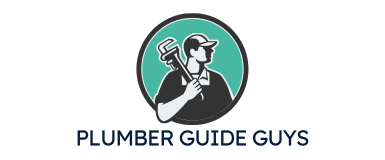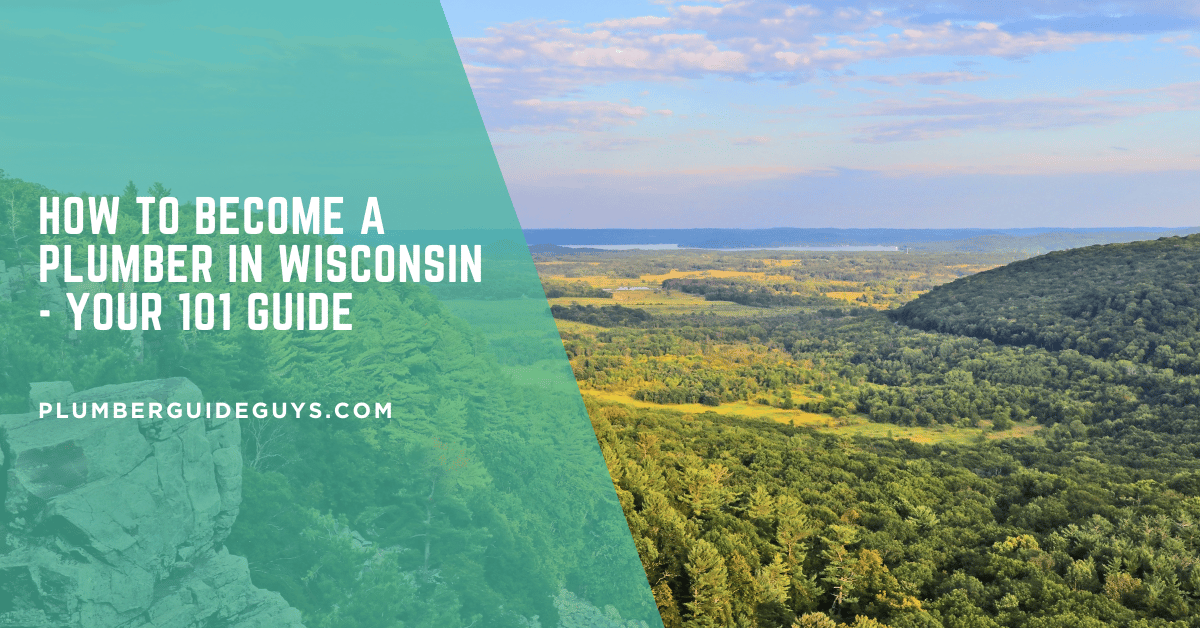Affiliate Disclosure
Plumber Guide Guys is a participant in the Amazon Services LLC Associates Program, an affiliate advertising program designed to provide a means for sites to earn advertising fees by advertising and linking to Amazon.
How to Become a Plumber in Wisconsin? Did you know plumbers in Wisconsin make an average of $62,370 a year? The best ones can earn up to $86,220. The plumbing field in Wisconsin is full of chances for those ready to learn and work hard.
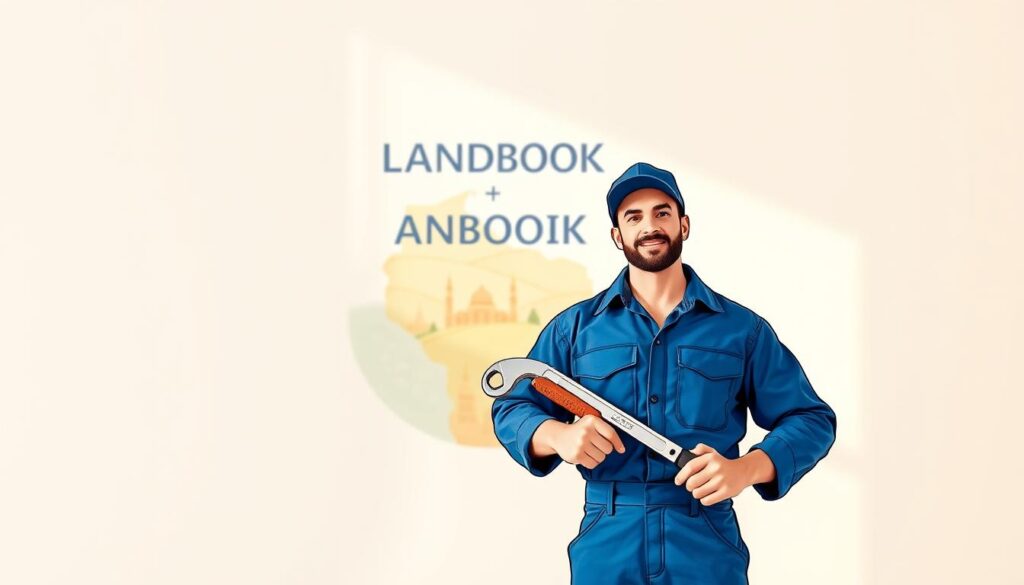
To become a licensed plumber in Wisconsin, you need to be dedicated and skilled. This guide will show you how to start your plumbing career. You’ll learn about the licensing process and the different paths you can take in Wisconsin.
If you want to be a plumber in Wisconsin, you must go through apprenticeships, education, and certifications. The state’s rules are in place to keep standards high and keep everyone safe.
Key Takeaways
- Wisconsin offers robust career opportunities in plumbing
- Apprenticeship is a key first step in plumbing
- State licensing is a must for plumbers
- Average annual salary ranges from $45,000 to $86,220
- There are many levels of certification
- Keeping your license means ongoing education
Table of Contents
Overview of Plumbing Career Opportunities in Wisconsin
The plumbing industry in Wisconsin is booming. It offers great job opportunities for skilled workers. With a strong job market and good pay, this trade is a path to success.
Wisconsin’s plumbing sector is growing fast. This is thanks to new construction, better infrastructure, and more homes. Knowing the wisconsin plumbing code helps you succeed in this field.
Industry Growth and Demand
The plumbing industry in Wisconsin is on the rise. It’s growing because of:
- More homes and buildings being built
- Old infrastructure needing updates
- People wanting green plumbing options
- New plumbing technologies
Career Advancement Possibilities
Plumbers in Wisconsin can move up in their careers. Here are the steps:
- Apprentice Plumber
- Journeyman Plumber
- Master Plumber
- Plumbing Business Owner
Salary Expectations Across Regions
Plumber salaries in Wisconsin change based on where you work and how long you’ve been doing it. Here’s what you might earn:
| Region | Entry-Level Salary | Experienced Salary |
|---|---|---|
| Milwaukee Metro | $45,000 | $85,000 |
| Madison Area | $42,000 | $80,000 |
| Rural Wisconsin | $38,000 | $70,000 |
Note: Salaries can change based on your skills, certifications, and experience.
Wisconsin Plumbing License Requirements and Regulations
Getting a Wisconsin plumber license means knowing the rules set by the Wisconsin Department of Safety and Professional Services (DSPS). To become a licensed plumber, you must meet several important requirements. These ensure you are skilled and keep the public safe.
The plumbing certification in Wisconsin is designed to protect everyone. To get your license, you need to meet certain criteria:
- Complete an approved apprenticeship program
- Accumulate required work experience hours
- Pass detailed licensing exams
- Show you know your stuff and can do the job
The DSPS watches over the plumber credentialing process. Your journey to becoming a licensed plumber will depend on your current skill level and career goals.
Here are the main things you need for your Wisconsin plumber license:
- Be at least 18 years old
- Have a high school diploma or similar
- Finish technical education programs
- Have work experience under a licensed plumber
Knowing these rules is key for a successful plumbing career in Wisconsin. Each step of the licensing process is made to make sure you’re ready. You’ll need the right skills and knowledge to offer safe, professional plumbing services.
Types of Plumbing Licenses Available in Wisconsin
Understanding plumbing licenses in Wisconsin can be tricky. The state has a detailed licensing system. It ensures plumbers are skilled and safe. You can choose from nine plumbing licenses across three levels to grow your career.
Knowing about these licenses is key for your career. Each level shows different levels of skill and responsibility in plumbing.
Apprentice Level Licenses
Beginners start with apprentice licenses. These let you work under supervision and learn by doing. There are three types of apprentice licenses:
- Apprentice Plumber
- Restricted Apprentice Plumber
- Limited Apprentice Plumber
Journeyman Level Licenses
Once you’ve finished your apprenticeship, you can become a journeyman plumber. Journeyman licenses show you’re skilled and can work on your own. There are three journeyman licenses:
- Journeyman Plumber
- Restricted Journeyman Plumber
- Limited Journeyman Plumber
Master Level Licenses
Reaching the top, you can get a master plumber license. Master licenses mean you’re at the highest skill level. They open up more career chances:
- Master Plumber
- Restricted Master Plumber
- Limited Master Plumber
Each license has its own rules and work scope. This lets you pick a path that fits your career dreams.
How to Become a Plumber in Wisconsin
Starting a plumbing career in Wisconsin needs a clear plan and a commitment to learning. You’ll go through several important steps to turn your interest into a fulfilling job.
To start your plumbing career in Wisconsin, follow a set of steps. These steps help you learn the skills and knowledge needed for the job.
- Start by meeting the minimum age requirement of 18 years
- Obtain a high school diploma or equivalent
- Register with the Wisconsin Department of Safety and Professional Services
Your career will have three main stages: Apprentice, Journeyman, and Master Plumber. Each stage needs specific training and a certification from the Wisconsin licensing authorities.
| Career Stage | Education Requirements | Experience Needed |
|---|---|---|
| Apprentice | Technical college program | 0-2 years |
| Journeyman | Completed apprenticeship | 3-5 years |
| Master Plumber | Advanced certification | 6+ years |
Reaching master plumber status usually takes 8-10 years. You’ll need to finish apprenticeships, pass exams, and show work experience at each level.
Staying committed to learning and following the requirements will help you succeed in your plumbing career in Wisconsin.
Wisconsin Plumbing Apprenticeship Programs
Starting a plumbing career needs hard work and training. A plumbing apprenticeship in Wisconsin is a great way to become a skilled plumber. It mixes hands-on learning with classroom lessons to get you ready for your career.
Required Hours and Duration
Wisconsin has strict rules for plumber apprenticeships. They last about five years. You’ll spend:
- 8,000 total training hours
- 7,428 hours on the job
- 572 hours in class
Educational Components
Your apprenticeship will teach you key plumbing skills. You’ll learn about:
- Plumbing code rules
- Reading blueprints and designing systems
- Safety and OSHA standards
- Materials and how to install them
- Math and science for plumbers
Finding an Apprenticeship Sponsor
Finding a sponsor is key for your plumbing career. Check out the Madison College plumbing apprenticeship program. Local groups like Associated Builders & Contractors (ABC) and Madison Plumbing Joint Apprenticeship Committee are good places to start.
Pro Tip: Get a high school diploma, stay fit, and show you’re serious about learning plumbing.
Educational Requirements and Training Programs
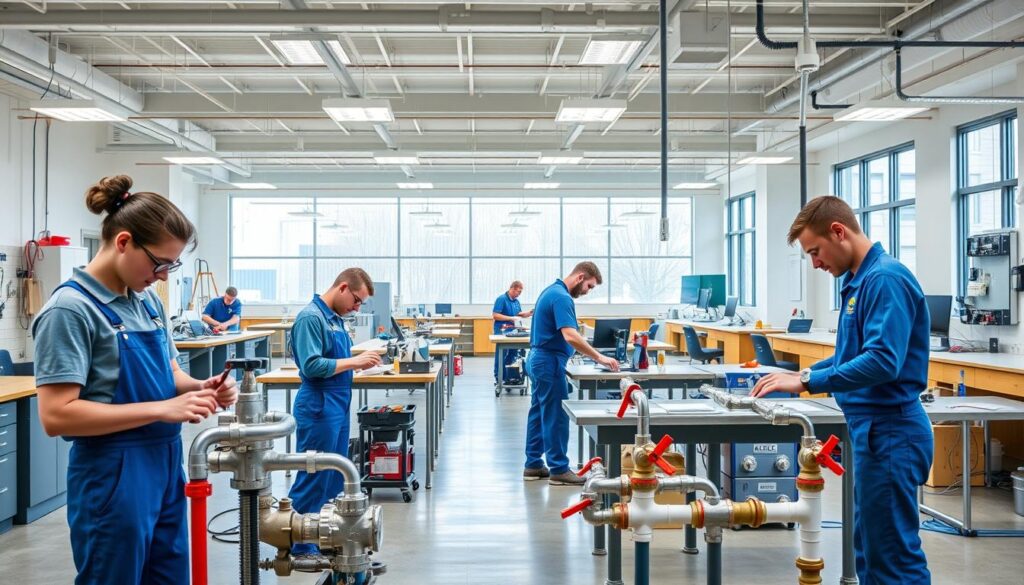
Starting a plumbing career needs careful planning. Wisconsin has top-notch plumbing trade schools to kickstart your journey. Technical colleges across the state offer Plumbing Technology certificate programs. These programs teach you the skills and knowledge you need.
Some of the best plumbing trade schools in Wisconsin are:
- Milwaukee Area Technical College
- Chippewa Valley Technical College
- Nicolet Area Technical College
- Mid-State Technical College
These programs focus on the wisconsin plumbing code and practical skills. You’ll learn in the classroom and get hands-on experience. This prepares you for the real world.
When picking a plumbing trade school in Wisconsin, look for:
- A detailed curriculum on local plumbing rules
- Hands-on workshop experiences
- Preparation for certifications
- Training on industry-standard tools and techniques
Certificate programs usually last 6-24 months. They give you a strong base in plumbing, safety, and technical skills. You’ll learn all about the wisconsin plumbing code, too.
“Education is the blueprint for a successful plumbing career” – Wisconsin Plumbing Association
Staying committed to learning is key. It helps you master plumbing and keep up with new industry standards.
Wisconsin Plumbing License Examination Process
To get your wisconsin plumber license, you must pass the state’s tough licensing test. The Department of Safety and Professional Services (DSPS) runs these tests. They check if you know your plumbing stuff well.
Getting ready for your plumbing test can be tough. But knowing what to expect can help you do well. The test checks if you know plumbing rules and standards.
Exam Structure and Content
Wisconsin has two main plumbing tests:
- Journeyman Plumber Exam
- Master Plumber Exam
Each test has different parts to test your plumbing knowledge:
- Technical plumbing principles
- Wisconsin-specific building codes
- Safety regulations
- Practical application scenarios
Study Resources and Preparation
Here are some tips to help you prepare:
- Review official DSPS study guides
- Attend preparatory workshops
- Practice with sample examination questions
- Collaborate with experienced plumbers
“Knowledge is the key to passing your plumbing certification exam.” – Wisconsin Master Plumber Association
Testing Locations and Scheduling
Tests are held at specific centers in Wisconsin. You must book your test online and pay the fees.
How long you should study varies. But most people spend 3-6 months getting ready for the test.
License Fees and Associated Costs
Getting a wisconsin plumber license means knowing about the different fees. The cost to become a licensed plumber changes based on your career level and license type.
Future plumbers need to plan for several important costs on their journey:
- Apprentice Level Fees:
- Application fee: $15
- Annual credential fee: $15
- Journeyman Plumber Credentials:
- Application fee: $10
- Examination fee: $20
- Master Plumber Licensing:
- Application fee: $20
- Examination fee: $30
Getting a plumbing certification in Wisconsin is more than just the initial fees. You’ll also need to think about study materials, training courses, and renewal costs. These expenses are key to growing your career in plumbing.
Pro tip: Always check with the Wisconsin Department of Safety and Professional Services for the most current fee structure and any possible updates.
Even though these fees might seem high, they’re worth it for a secure and rewarding plumbing career. Each license level brings new chances for growth and higher pay.
Continuing Education and License Renewal Requirements
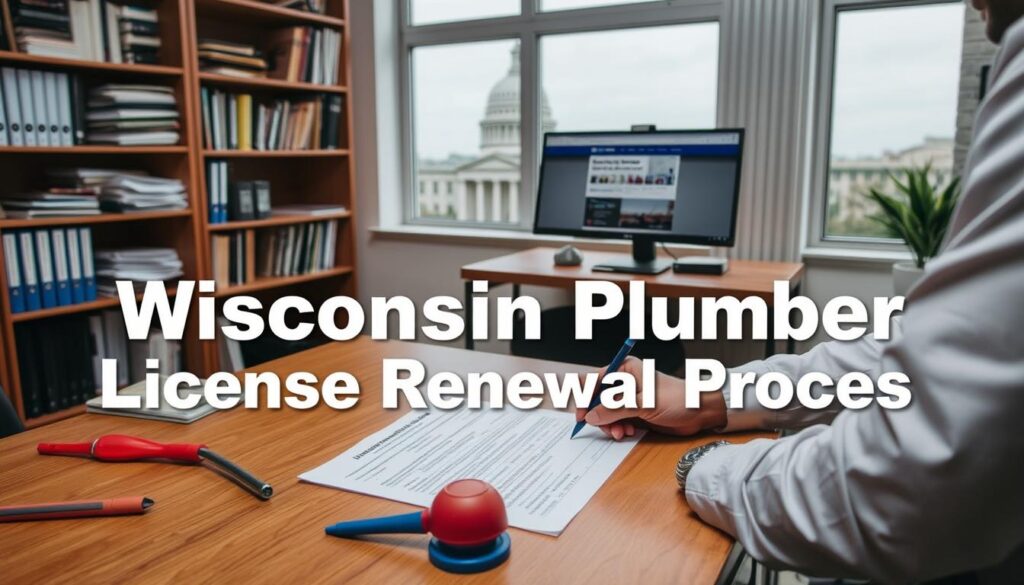
To keep your wisconsin plumber license, you must focus on continuing education and renewal. In Wisconsin, there are specific rules to follow. These rules help keep your professional status up to date.
Your plumbing license is valid for four years, ending on March 31. To keep your license active, you need to follow a few important steps:
- Keep track of when your license expires
- Finish the required continuing education hours
- Send in your renewal documents
- Pay any renewal fees
Continuing education is key to staying current with plumbing codes and standards. The amount of education needed varies by license level:
- Apprentice Plumbers: Need fewer continuing education hours
- Journeyman Plumbers: Require more in-depth training updates
- Master Plumbers: Must complete the most extensive education
The Wisconsin Department of Safety and Professional Services manages license renewals. Make sure you have all the needed documents ready. This includes proof of education and current contact info, well before your license expires.
Renewal fees depend on your license type. Plan your budget to cover these costs. This way, you can keep your professional status without any breaks.
Insurance and Business Requirements for Licensed Plumbers
Starting a plumbing business in Wisconsin is more than just knowing how to fix pipes. As a master plumber, you must also deal with legal and financial rules. These rules help you set up your business right.
Knowing the rules for running a plumbing business in Wisconsin is key to success. Plumbers must follow certain laws and insurance rules before starting their own shop.
Liability Insurance Essentials
Keeping your plumbing business safe starts with good insurance. You’ll need to get:
- General liability insurance
- Professional liability protection
- Property damage coverage
- Equipment insurance
Workers’ Compensation Guidelines
In Wisconsin, businesses with workers must follow certain insurance rules. As a master plumber, you must:
- Get workers’ compensation insurance
- Sign up with the state’s unemployment program
- Keep your insurance up to date
Business Registration Process
To run your plumbing business legally, you’ll need to do a few things:
- Register with the Wisconsin Department of Revenue
- Get a Dwelling Contractor certification
- Get a business tax ID
- Make sure you meet all licensing rules
“Success in the plumbing business is built on technical expertise and solid legal foundation.” – Wisconsin Contractors Association
These rules might seem hard to follow, but they’re vital for a good plumbing business in Wisconsin.
Professional Plumbing Organizations and Resources in Wisconsin
Starting your plumbing career in Wisconsin is easier with professional groups and state resources. The Wisconsin Department of Workforce Development helps plumbers grow their careers. They also explain the requirements for plumbers in Wisconsin.
Professional organizations keep you updated on industry trends and rules. They offer chances to network and grow professionally:
- Wisconsin Plumbing & Mechanical Association (WPMA)
- Plumbing-Heating-Cooling Contractors Association of Wisconsin
- Local trade unions for plumbing workers
State agencies are key for plumbing professionals. The Department of Safety and Professional Services guides on licensing and rules. They also have the latest on what plumbers need to know in Wisconsin.
Online resources are great for your career. Look into:
- State apprenticeship websites
- Professional development webinars
- Industry-specific publications
Pro tip: Joining these organizations can boost your network and keep you in the loop on Wisconsin’s plumbing jobs.
Conclusion
Starting a career as a plumber in Wisconsin is both exciting and rewarding. It’s important to know the requirements to move forward. You’ll need to complete an apprenticeship and pass licensing exams to become a skilled plumber.
Being dedicated to learning and growing is key to success in this field. To become a plumber in Wisconsin, you must keep learning, improve your technical skills, and follow industry standards. The plumbing industry in Wisconsin offers stable jobs and good pay for those who are committed.
Remember, your skills are vital to communities across the state. The path to becoming a plumber requires hard work and determination. But, it leads to financial security, personal fulfillment, and a respected career.
Wisconsin’s plumbing industry is open to those who are eager to turn their passion into a career. Your journey as a licensed plumber begins with understanding the requirements, striving for excellence, and taking steps towards your goals.
